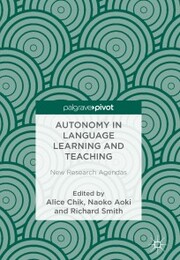Detailansicht
Autonomy in Language Learning and Teaching
eBook - New Research Agendas
ISBN/EAN: 9781137529985
Umbreit-Nr.: 4526330
Sprache:
Englisch
Umfang: 0 S., 1.33 MB
Format in cm:
Einband:
Keine Angabe
Erschienen am 07.12.2017
Auflage: 1/2017
E-Book
Format: PDF
DRM: Digitales Wasserzeichen
- Zusatztext
- <div>This book seeks to expand the research agendas on autonomy in language learning and teaching in diverse contexts, by examining the present landscape of established studies, identifying research gaps and providing practical future research directions. Based on empirical studies, it explores research agendas in five emerging domains: language learning and teaching in developing countries; social censure and teacher autonomy; learner autonomy and groups; learner autonomy and digital practice; and finally, learner autonomy and space. In doing so, it sheds new light on the impact of digital media, group dynamics and the application of ecological perspectives on learner autonomy. The contributors present a novel reconsideration of new learning affordances, and their discussion of spatial dimensions provides much needed expansion in the field. This book will have international appeal and provide an invaluable resource for students and scholars of second language learning and higher education, as well as teacher educators.<br></div><div><br></div><div>Chapter 2 of this book is open access under a CC BY 4.0 license via https://link.springer.com/content/pdf/10.1057%2F978-1-137-52998-5_2.pdf.&nbsp;<br></div><div><br></div><div><br></div><div><br></div><div><br></div><div><br></div>
- Kurztext
- This book seeks to expand the research agendas on autonomy in language learning and teaching in diverse contexts, by examining the present landscape of established studies, identifying research gaps and providing practical future research directions. Based on empirical studies, it explores research agendas in five emerging domains: language learning and teaching in developing countries; social censure and teacher autonomy; learner autonomy and groups; learner autonomy and digital practice; and finally, learner autonomy and space. In doing so, it sheds new light on the impact of digital media, group dynamics and the application of ecological perspectives on learner autonomy. The contributors present a novel reconsideration of new learning affordances, and their discussion of spatial dimensions provides much needed expansion in the field. This book will have international appeal and provide an invaluable resource for students and scholars of second language learning and higher education, as well as teacher educators.Chapter 2 of this book is open access under a CC BY 4.0 license via https://link.springer.com/content/pdf/10.1057%2F978-1-137-52998-5_2.pdf.&nbsp;
- Autorenportrait
- <div><b>Alice Chik</b> is Senior Lecturer in Educational Studies and a leader of the Macquarie Multilingualism Research Group at Macquarie University, Australia. Alices primary area of research examines language learning and multilingual literacies in digital environments. Her particular interest in multilingualism is public discourse, representation, and narratives of everyday multilingual experience. She is the lead co-editor of <i>The multilingual city: Sydney case studies</i> (2018). </div><div><br></div><div><b>Naoko Aoki</b> is Professor of the Graduate School of Letters, Osaka University, Japan, where she teaches Japanese as a second language pedagogy. She is a founding co-coordinator of JALTs Learner Development SIG and was a co-convenor of AILAs Learner Autonomy Research Network from 2011 to 2014. Her publications include<i>Mapping the terrain of learner autonomy</i> (2009), co-edited with Felicity Kjisik, Peter Voller and Yoshiyuki Nakata.</div><div><br></div><div><b>Richard Smith</b>is a Reader and Associate Professor at the University of Warwick, UK. He co-founded the JALT Learner Development SIGin 1994. His publications include<i>Learner Autonomy across Cultures</i> (co-edited with David Palfreyman, 2003), as well as chapters and articles on teacher-learner autonomy, pedagogy of autonomy as appropriate methodology, and the relationship of teacher-research and teacher autonomy. Recently he has been focusing on work with teachers in developing countries in this latter area as academic coordinator for teacher-research mentoring schemes in Latin America and India. </div><div><br></div><div><br></div><div><br></div><div><br></div><div><br></div>
